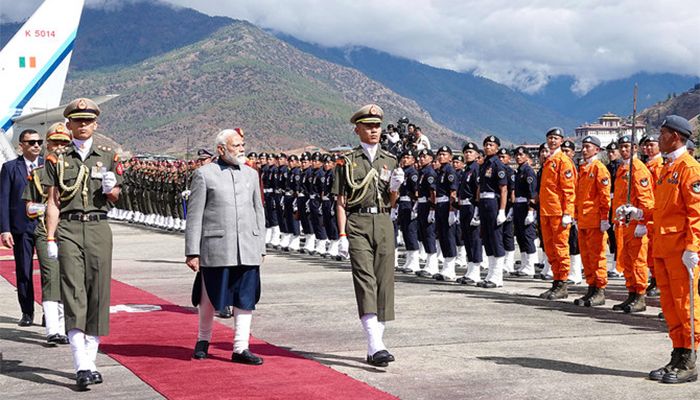
Desk Report
Publish: 22 Mar 2024, 02:43 pm

Photo: Collected
Indian Prime Minister Narendra Modi landed in Bhutan on Friday, in a move to shore up ties with the Himalayan neighbor as rival China works to increase its influence there.
The trip, likely Modi's last foreign journey before he seeks a third term in India's weekslong general election starting April 19, comes just days after he hosted the new Bhutanese prime minister, Tshering Tobgay.
India's Ministry of External Affairs on Friday described Modi's visit to Bhutan as continuing a tradition of regular high-level exchanges between the two countries, and his government's "Neighborhood First Policy" of developing friendly and mutually beneficial relations with surrounding nations. Modi is due to meet with Bhutan's King Jigme Khesar Namgyel Wangchuck, apart from holding talks with Tobgay, the statement said.
While meeting in New Delhi on March 14, Modi and Tobgay reviewed progress in various areas including infrastructure development, connectivity, energy, hydropower cooperation, people-to-people exchanges and development cooperation. "They reaffirmed their commitment to further strengthen the special and unique India-Bhutan friendship," another official statement said.
The close proximity of the two visits "indicates close relations as both countries navigate the relationship through a changing internal and external context for Bhutan," said Prerna Gandhi, an associate fellow at the Vivekananda International Foundation, a security think tank.
Looming in the background is China. Beijing does not have diplomatic ties with Bhutan but has been stepping up efforts to establish them, amid ongoing talks to resolve boundary issues.
Sino-Bhutanese border talks formally started in 1984 but had been largely stalled since a 73-day military standoff in 2017 between India and China over the Doklam Plateau, where the boundaries of the two giants and Bhutan meet. China and Bhutan agreed in 2021 to expedite the negotiations, and if a settlement is reached, that could have strategic implications for New Delhi, which has its own long-running border dispute with Beijing.
According to Raj Kumar Sharma, a senior research fellow at NatStrat -- an independent think tank working on India's national security and foreign policy -- Bhutan and India face similar Chinese pressure on their territorial sovereignty and integrity.
"China seeks to achieve a 'package deal' with Bhutan," he told Nikkei Asia, noting that Beijing has been constantly pressuring Thimphu to concede territory in its west, where the Doklam Plateau is situated. In return, China could give up its claims in northern and eastern border areas with Bhutan.
Doklam is strategically significant for India due to its proximity to the Siliguri Corridor, a narrow strip of land known as the Chicken's Neck, which connects northeastern Indian states with the rest of the country. Some experts feel any possible land swaps could raise worries for India about accessibility in a hypothetical conflict, while potential Chinese diplomatic representation in Bhutan could undermine New Delhi's influence.
"Under its policy of 'incremental erosion of buffers,' China seeks to replicate its Nepal model in Bhutan as well," Sharma said. "In Nepal, [it] has used all the levers of power to challenge India's presence. It seeks to do the same in Bhutan as well."
Late last year, China and Bhutan agreed on the responsibilities of a technical team that will work on border delimitation. A joint news release issued by the Chinese government said that "the discussions were held in a warm and friendly atmosphere."
China's economic presence is also gradually increasing in Bhutan, as it accounts for more than a quarter of Thimpu's trade, Sharma said. Notable sectors with Chinese involvement include telecommunications, highways and hydropower.
"Bhutan has to be careful and should not miss the global trend, when the majority of countries are trying to implement 'de-risking' from the Chinese economy," the researcher said.
Gandhi at the Vivekananda foundation observed that "economic stagnation and an unprecedented skilled labor exodus coupled with China's charm offensive and simultaneous pressure presents a volatile environment for Bhutanese policymakers."
However, she added that India, being the traditional security guarantor of the kingdom, "has been kept in the loop of all discussions" involving Bhutan and China. She also pointed out that India remains the principal development partner for Bhutan.
"Going by the increasing pace of boundary talks between Bhutan and China, India cannot impinge on the establishment of diplomatic relations between them, but Bhutan has been very sensitive of Indian interests," Gandhi told Nikkei, implying that the kingdom would not agree to a deal that harms New Delhi's interests.
Sharma of NatStrat said that Modi's visit, apart from assuring the newly elected government in Bhutan in the security sphere, is an expression of political and economic solidarity.
He noted that in India's interim budget for the financial year starting next month, Bhutan has been allocated the biggest aid share in South Asia at 20.68 billion rupees ($248.8 million). Rail connectivity is being planned between the northeastern Indian state of Assam and the Bhutanese town of Gelephu, among several other initiatives._AFP
Subscribe Shampratik Deshkal Youtube Channel
Topic : Indian Prime Minister Narendra Modi China India
© 2024 Shampratik Deshkal All Rights Reserved. Design & Developed By Root Soft Bangladesh